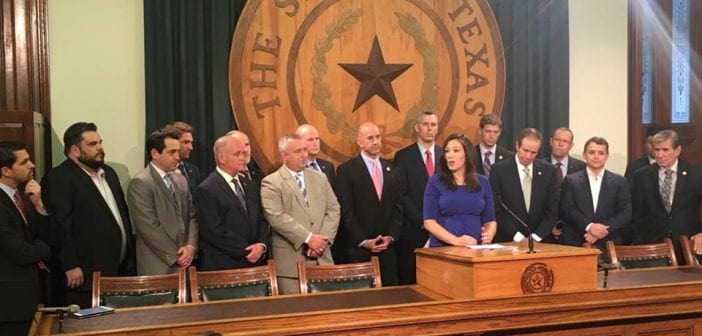Austin, Texas—May 2, 2017: Today, Texas Right to Life joined the Freedom Caucus, and a conservative coalition of Texas House members for a press conference. The press conference took place in the Speaker of the House Press Room. The topic was Texas Right to Life’s priority legislation in the 85th Session of the Texas Legislature.
Texas Right to Life is the oldest and largest Pro-Life organization in Texas with a proven track record of lobbying for the strongest Pro-Life reforms in the Texas Legislature. While many bills are marketed as “Pro-Life,” only substantive Pro-Life bills will save lives. With merely 27 days remaining in the 85th Legislative Session, the Texas House has not passed any Pro-Life bills. The Texas Senate has passed multiple Pro-Life bills including Senate Bill 415, the Dismemberment Abortion Ban, and Senate Bill 20, Pro-Life Health Insurance Reform.
If life-saving bills are not passed in the final days of the legislative session, more than 100,000 lives will be lost to abortion before the Texas Legislature meets again. Only two of Texas Right to Life’s priority bills have been heard in House committees (House Bill 2063 and House Bill 1113). All House bills must be voted out of committee by Monday, May 8, and passed on the House floor by Thursday, May 11. As we have seen in previous sessions, leaving important Pro-Life legislation to the final days and hours allows anti-Life Democrats to chub, ensuring the clock runs out on life-saving reforms.
As John Seago, Legislative Director for Texas Right to Life, explained, “The concern over fetal tissue donation and research or the legislation that imposes burial and cremation regulations on abortion clinics fundamentally miss the mark. These policies merely debate what to do with the body of the child after he or she dies. The Pro-Life movement in Texas must prioritize legislation that will stop the injustice of elective abortion from occurring in the first place.”
Texas Right to Life joins other conservative groups in calling attention to the neglect of priority legislation by representatives who call themselves “Pro-Life.” The greatest priority this session is passing the Dismemberment Abortion Ban, which would outlaw the inhumane practice of killing a preborn child in the womb by tearing her limb from limb while her heart is still beating. Senate Bill 415 passed on March 20 winning bipartisan support with Democrat Senators Lucio and Zaffirini voting for the bill.
In addition to passage in the Senate, Texas Right to Life’s priority legislation has far-reaching support. The Dismemberment Abortion Ban received support from 95% of the voting delegates at the Republican Party of Texas convention (more than 8,000 activists voted for the policy), making the proposal the most popular Pro-Life policy plank in the 2016 Republican Party Platform. Texas Attorney General Ken Paxton indicated support for the life-saving legislation in joining the amicus brief defending the constitutionality of Alabama’s Dismemberment Abortion Ban. Furthermore, the House version of the Dismemberment Abortion Ban, House Bill 844 by Representative Stephanie Klick, has 67 coauthors.
Texas Right to Life General Counsel Emily Cook stated, “Texas used to be within the top five of Pro-Life states in the nation; we are now ranked 17th. With 95 Republicans in the Texas House of Representatives, passing conservative legislation should not be this difficult.”
As we enter the final days of the session, Texas Right to Life joins the Freedom Caucus, chaired by Representative Matt Schaefer, other Pro-Life members, as well as numerous conservative groups in Austin in calling for the passage of life-saving Pro-Life bills.
Posted by Texas Right to Life on Tuesday, May 2, 2017
Founded in 1973, Texas Right to Life is the oldest and largest Pro-Life organization in Texas. Recognized as the statewide leader of the Pro-Life movement in Texas, TXRTL works through legislation and education to protect the rights of the unborn, persons with disabilities, the sick, the elderly, and the vulnerable through legal, peaceful, and prayerful means.



